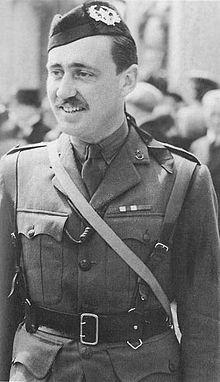John Dutton Frost
| John Dutton Frost | |
|---|---|

John Frost, after having received his Military Cross.
The photograph shows then Lieutenant Colonel Frost in the uniform of his parent regiment, the Cameronians (Scottish Rifles). |
|
| Nickname(s) | Johnny |
| Born |
31 December 1912 Pune, India |
| Died | 21 May 1993 (aged 80) West Sussex, England |
| Allegiance |
|
| Service/branch |
|
| Years of service | 1932–1968 |
| Rank | Major General |
| Unit |
Cameronians (Scottish Rifles) Parachute Regiment |
| Commands held |
2nd Battalion, Parachute Regiment 52nd (Lowland) Infantry Division |
| Battles/wars | |
| Awards |
Companion of the Order of the Bath Distinguished Service Order & Bar Military Cross |
Major General John Dutton (Johnny) Frost CB, DSO & Bar, MC, DL (31 December 1912 – 21 May 1993) was an airborne officer of the British Army best known for being the leader of the small group of airborne forces that actually arrived at Arnhem bridge during the Battle of Arnhem in Operation Market Garden, in World War II. He was one of the first to join the newly formed Parachute Regiment and served with distinction in many wartime airborne operations until he was injured and captured at Arnhem. His army career continued until his retirement in 1968.
Frost was the son of Frank Dutton Frost CBE MC, a British Army officer, and his wife, Elsie Dora (née Bright). He was educated at Monkton Combe School in Somerset, John Frost joined the British Army on 1 September 1932, when on graduation from the Royal Military College, Sandhurst, he was commissioned as a second lieutenant in the Cameronians (Scottish Rifles). From 1938 to 1941 Frost worked with the Iraq Levies as a captain. He joined the Parachute Regiment in 1941.
...
Wikipedia
